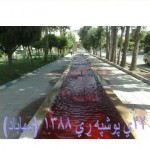Thursday
Jul162009
The Urumqi Violence: Chinese Actions and Overseas Responses
 Thursday, July 16, 2009 at 5:49
Thursday, July 16, 2009 at 5:49  To recap: after the raid on a toy factory in Shaoguan, organized by thousands of Han Chinese, and the murder of young Uighurs while they were sleeping, protests took place on July 5. There were clashes between Uighurs and Han Chinese, and then China's armed forces intervened.
To recap: after the raid on a toy factory in Shaoguan, organized by thousands of Han Chinese, and the murder of young Uighurs while they were sleeping, protests took place on July 5. There were clashes between Uighurs and Han Chinese, and then China's armed forces intervened.Since then, Chinese officials have stated that 184 people, many of whom are Han Chinese, have died and 1680 have been wounded. Uighurs claim that the death toll is at least 1000 and may be twice that number.
The second round of demonstrations and a flood of blood came after the statement of Wang Luquan, the special mayor appointed to East Turkestan on 12 July. Wang Luquan declared that those found guilty of provoking the demonstrations, out of thousands of Uighurs arrested by Chinese armed forces, would be executed. A day later, thousands of Uighurs protested, and two were killed. According to the East Turkestan Culture and Solidarity Association, China is not allowing non-partisan observers to enter the region. Houses are still being searched and people taking photographs or making recordings are arrested.
With Wang Luquan stating that “no Chinese should fear since armed forces are with them”, the Association is worried that the blood flood may continue. However, Chinese officials state that the situation in East Turkestan is under control.
Reactions around the World:
Four days after Turkish Prime Minister Recep Tayyip Erdogan’s “genocide” accusation on July 10, the China Daily reiterated the official number of deaths and asked Erdogan “to take those words back.” The Turkish PM may be unmoved, however. His opening to improve relations with the Middle East may now have another supportive pillar farther east with his support of Uighurs, who are relatives of the Turkish people.
Perhaps the most striking response is coming from Iran. Ayatollah Cafer Subhani said that “it is a humanitarian and Islamic duty to defend the ones imposed pressure and cruelty.” He added, “Muslims used to be oppressed only in Western countries but they are being oppressed in yesterday’s communist and today’s capitalist China as well.” Subhani, supporting the Uighur, saw an Islamic nation united under ‘the pathway of God” versus a Western bloc, including Beijing, united under ‘the temporary power of dollars". Ayatollah Ahmed Khatemi declared, “Our religious teachings order us to protect all aggrieved people, especially Muslims bullied by others….The constitution of the Islamic Republic sees the Islamic world as one and states the protection of aggrieved Muslims as a duty of the Republic.”
[Editor's Note: These statements may be set against others of the Iranian Government, noted elsewhere on Enduring America, offering support for the Chinese position.]
In the USA, Democrat Bill Delahunt and Republican Dana Rohrabacher introduced a bill in Congress accusing China of extremely violent oppression and supporting Rebiya Kadeer, the Chairwoman of the World Uighur Congress, who has been blamed by Chinese officials for instigating riots. Delahunt said, “Stop slandering against a woman who has been nominated as a candidate to Nobel Peace Prize three times." Rohrabacher added, “We are condemning everyone applying to force based on race, religion and other reasons. This conflict is a result of Beijing’s intended plan to destroy the lands of Uighurs. In the long-term, it is China’s policy of genocide against the Uighur people.”
tagged  Ayatollah Ahmed Khatami,
Ayatollah Ahmed Khatami,  Ayetollah Cafer Subhani,
Ayetollah Cafer Subhani,  Bill Delahunt,
Bill Delahunt,  China,
China,  Dana Rohrabacher,
Dana Rohrabacher,  East Turkestan,
East Turkestan,  East Turkestan Culture and Solidarity Association,
East Turkestan Culture and Solidarity Association,  Iran,
Iran,  Recep Tayyip Erdogan,
Recep Tayyip Erdogan,  Rubiya Kabeer,
Rubiya Kabeer,  Shaoguan,
Shaoguan,  Turkey,
Turkey,  Uighurs,
Uighurs,  Urumqi,
Urumqi,  Wang Luquan in
Wang Luquan in  China & East Asia,
China & East Asia,  Global,
Global,  Middle East & Iran,
Middle East & Iran,  US Politics
US Politics
 Ayatollah Ahmed Khatami,
Ayatollah Ahmed Khatami,  Ayetollah Cafer Subhani,
Ayetollah Cafer Subhani,  Bill Delahunt,
Bill Delahunt,  China,
China,  Dana Rohrabacher,
Dana Rohrabacher,  East Turkestan,
East Turkestan,  East Turkestan Culture and Solidarity Association,
East Turkestan Culture and Solidarity Association,  Iran,
Iran,  Recep Tayyip Erdogan,
Recep Tayyip Erdogan,  Rubiya Kabeer,
Rubiya Kabeer,  Shaoguan,
Shaoguan,  Turkey,
Turkey,  Uighurs,
Uighurs,  Urumqi,
Urumqi,  Wang Luquan in
Wang Luquan in  China & East Asia,
China & East Asia,  Global,
Global,  Middle East & Iran,
Middle East & Iran,  US Politics
US Politics 
 2140 GMT: A Convenient Business Trip. Reports that
2140 GMT: A Convenient Business Trip. Reports that 
 Colette Mazzucelli, who has written for Enduring America and our partner website
Colette Mazzucelli, who has written for Enduring America and our partner website